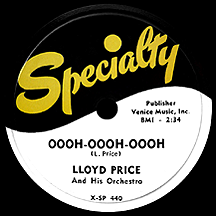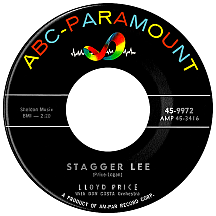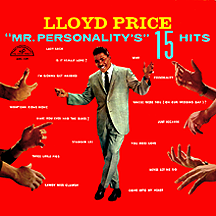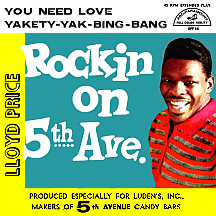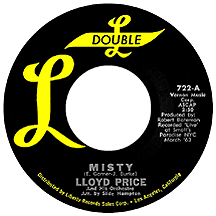LLOYD PRICE
It was the biggest year so far for rock and roll. By the start of 1959, rock, R&B and teen-oriented music dominated the popular charts, leaving purveyors of pop scrambling to adapt. American Bandstand had gone national 17 months earlier, exposing millions to the music of our nation's youth every day. Top 40 radio stations, previously a trailblazing few in major markets, were rapidly appearing in medium- and smaller-sized cities from coast to coast; hardly a week went by in '59 that several new ones didn't jump on the bandwagon. The rock and roll movement of the mid-'50s had achieved its takeover of the music industry in just a few short years, and during that final year of the decade, no one was hotter than Lloyd Price.
With the exception of Fats Domino, Price epitomizes New Orleans rhythm and blues; it didn't hurt that the Fat Man was involved in making Lloyd's first records. Born in 1933, he grew up in Kenner, Louisiana and spent much of his childhood listening to his family's phonograph and the blues and R&B records his older brothers bought whenever they had the money. Early favorites were Louis Jordan, Charles Brown, Amos Milburn and a boogie woogie piano lady, Camille Howard (who pounded the keys with forceful abandon on the 1948 instrumental hit "X-Temporaneous Boogie"). He often played his family's piano and later, during high school, practiced on a hand-me-down flugelhorn. Music was an obsession, but through his mother, Beatrice Price, who owned a local restaurant, he became interested in the business end of things, which would keep him on his toes, and serve him well, throughout his career.
Older brother Leo put a band together and Lloyd became its lead singer; they began gigging at parties, eventually getting hired at a local nightclub. "Lawdy, Miss Clawdy!" was a catchphrase James "Okey Dokey" Smith of New Orleans' WBOK radio often used on his show. Lloyd fashioned a song out of the phrase and it went over big with club patrons while establishing a connection to the local celebrity. Next thing you know, Dave Bartholomew (Domino's songwriting and record-making partner) showed up to check out the act, later returning with Art Rupe of Los Angeles's Specialty Records (Bartholomew was Rupe's main contact in the Crescent City). Rupe signed him then and there.
Lloyd Price was 19 years old when he recorded "Lawdy Miss Clawdy" with a top-flight lineup of studio musicians: Lee Allen on sax, Frank Fields on bass, Earl Palmer on drums and the already legendary Domino providing that cool opening piano jive. The record could have been a major hit in New Orleans and nowhere else, but that wasn't the case. It was just too hot to stay within the Louisiana state limits, regardless of whether listeners outside the area were aware of its association with a local deejay. The record debuted on the R&B charts in May 1952 and spent most of July and August at number one
"Oooh-Oooh-Oooh" and "Restless Heart," both written by Price, also contained the Fats Domino vibe; each was a top ten hit in the fall of '52. There was one more top-selling Specialty single, "Tell Me Pretty Baby" backed with "Ain't it a Shame," and a few less successful releases before Lloyd was drafted by the Army and, in short order, found himself serving in Korea. He wasn't happy about it at first, until the Army, aware of his status as a hitmaking artist, detached him to a Special Services unit, after which he entertained the troops, gaining many friends and personal contacts along the way. Some of those friendships would come in handy after his tour of duty.
Little Richard became a star while Price was on the other side of the world, and he returned to find out he had been upstaged and replaced at Specialty Records. So he hired a lawyer to advise him on future endeavors...and threw himself into learning more about the record business. Bill Boskent, also of New Orleans, became his business manager and the two set up operations in Washington, D.C. Along with West Virginia dance promoter Harold Logan, a friend of Lloyd's during his time in Korea, they formed KRC Records and "Just Because," another composition by Price, was recorded. Through aggressive local promotion, it started getting airplay in the D.C. and Baltimore markets. Meanwhile, Lloyd's chauffeur Larry Williams decided he had star potential of his own. He quit rather abruptly, headed to L.A., and convinced Rupe to sign him to Specialty based on his affiliation with Price. He made his own version of "Just Because" and got it on the market, lickety-split.
Sam Clark and Larry Newton started ABC-Paramount Records in 1955 with heavy backing by (no surprise here) ABC-TV and Paramount Studios. As of the start of 1957, Eydie Gorme was about the only artist on the label's roster who had sold records in respectable numbers. They were in hot pursuit of singers that could put them in a position to compete as the major label they purported to be. Price and Logan signed on and Lloyd became the first artist with youth appeal to have a hit with the label; working against the clock, "Just Because" was rereleased, landing in the top 40 (and R&B top ten) in April, successfully eclipsing the Larry Williams version. Five months later, ABC-Paramount newbie Paul Anka hogged the spotlight with his - and the company's - first number one hit, "Diana." But that was okay; Lloyd Price's big splash was still to come.
Price and Logan separated themselves from Baskent when the ABC deal came along, focusing on the details of their contracts, in a businesslike manner, to secure the best possible arrangement. Pianist "Big John" Patton joined Lloyd's band and began contributing songs he'd written (later, as an organist, he made many classic jazz recordings for the Blue Note label). "You Need Love," an uptempo Price-Logan tune, failed to catch on in the fall of 1958, but its flip side wound up being the fluke that sent Price to the top. "Stagger Lee" was a traditional song based on the St. Louis murder of Billy Lyons, by Lee Sheldon in 1895, the result of a drunken argument. Many versions of the song appeared throughout the 20th century with a lack of consensus as to the incident's exact details or the spelling of Sheldon's nickname, "Stagolee," "Stack-O-Lee," etc. Leon T. Gross, recording as Archibald, had most recently hit the R&B charts in 1950 with his take on the story, "Stack-A-Lee."
Lloyd had been doing "Stagger Lee" in his act since his days in Korea, where he acted out parts of the story-in-song concerning, in his version, an argument over cheating at gambling. But in early 1959, radio programmers preferred the song to its A side and listeners reacted immediately, despite the violent nature of the lyrics: 'Stagger Lee went to the barroom and he stood across the barroom door, said now nobody move and he pulled his .44...Stagger Lee shot Billy, he shot that poor boy so bad, till the bullet came through Billy and it broke the bartender's glass.' The gritty subject matter was offset by backing vocals provided by pop act The Ray Charles Singers (later known for the hit "Love Me With All Your Heart" in 1964), featured on a number of his ABC-Paramount recordings in an effort to help Price cross over to mainstream listeners through airplay on pop stations (though he didn't expect it to happen with this particular song). The record became one of the biggest hits of 1959, topping the pop and R&B charts simultaneously in February and March.
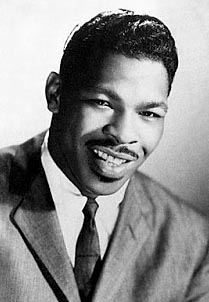
While it was still headed for number one, Price performed the song on Dick Clark's American Bandstand, but Clark took issue with the violence and insisted he do a milder version, the insinuation being that it would otherwise be banned from the show. Lloyd complied (since in those days, Bandstand could make or break a record), rewriting the song without the gambling or killing, instead making it a fight over a woman: 'It was Stagger Lee and Billy, Billy took poor Stagger's date...he said you did me wrong Billy and that's one thing that I hate...Stagger Lee and Billy never fussed or fought no more, because he got back his girlfriend and Stagger Lee was no more sore!' This watered-down version was only played on Bandstand; radio stayed with the original (the alternate version wasn't released but did show up on album compilations years later).
Patton collaborated with Price and Logan on the lyrics of the next hit, "Where Were You (On Our Wedding Day)?" In contrast to all the effort put into the massive "Stagger Lee," Price has said he and Logan threw the next single, "Personality," together in about 20 minutes. A seemingly surefire chart-topper, it instead spent three weeks at number two that summer behind Johnny Horton's blockbuster "The Battle of New Orleans." His second million seller, it has become the singer's trademark; he's been known as "Mr. Personality" ever since. Lloyd pulled off a 1-2-3 punch with "I'm Gonna Get Married" ('Johnny you're too young!'), an apparent prequel to the earlier "Where Were You...?" that hit number three in September (flip side "Three Little Pigs" breathed new life into the famous fairy tale on the R&B charts).
"Come Into My Heart" went top 20 near the end of the year. No artist had a run in '59 quite like Price, who scored with six big hits, of which three were absolute monsters. It proved difficult to repeat, or even come close to, yet 1960 was solid; "Lady Luck," "No If's - No And's" and "Question" were all hits that year. But Price and Logan didn't bother to vary the formula in '61 and came up empty with every attempt. When ABC-Paramount chose not to renew Price's contract in 1962, the two knew it was time for a change and their business sense kicked into a higher gear. They started the Double-L label ("L" for Lloyd, "L" for Logan) and set up distribution through Liberty Records. Wilson Pickett had just delivered a rip-roaring lead vocal on The Falcons' hit "I Found a Love" and they signed him as a solo act, leading to three chart singles before the "Wicked" one moved to Atlantic and enjoyed a seven year run of screamin' good hits.
Price put out seven singles of his own on Double-L, the biggest being a live recording of the Erroll Garner-Johnny Burke classic "Misty." This version had a big band feel to it, far removed from any of Lloyd's previous work. Of literally hundreds of recordings of the song, only the 1959 smash by Johnny Mathis and Ray Stevens' 1975 banjo-pickin' rendition were bigger hits. Double-L folded in 1966, but by then Price had made records for the Monument label with minor success and branched out by purchasing the recently-bankrupt Birdland jazz club, renaming it Lloyd Price's Turn Table and reconfiguring the venue as a dance club (some years later it burst forth as Birdland once again). After that he moved around, recording briefly for the Reprise, Hurd and Jad labels, then for a new label of his own, Turntable Records, where he scored an R&B hit, "Bad Conditions," in 1969. He continued making records, for several other companies, in the 1970s.
Longtime partner Harold Logan was murdered in 1969 and the case was never solved. After his recording career stalled, Lloyd Price went with his backup plan and plunged head-on into a number of business ventures. In a bold move he relocated to Africa, affiliating himself with American investors there. He worked with Don King to promote superstar boxing matches overseas, including the 1974 "Rumble in the Jungle" in Zaire, pitting Muhammad Ali against George Foreman, and the 1975 "Thrilla in Manila" between Ali and Joe Frazier. On his return to the U.S. in the early '80s, he started a company that developed low income housing for underprivileged minorities. In the early '90s, after a long hiatus from show business, he resumed singing, but made only occasional appearances. These days he still performs while keeping those business skills sharp; if you're ever down south, pick up a bag of Lloyd's original recipe "Lawdy Miss Clawdy" brand cookies!
NOTABLE SINGLES:
- Lawdy Miss Clawdy - 1952
- Oooh-Oooh-Oooh /
Restless Heart - 1952 - Tell Me Pretty Baby /
Ain't it a Shame - 1953 - Just Because - 1957
- Lonely Chair - 1957
- Stagger Lee - 1959
- Where Were You (On Our Wedding Day)? - 1959
- Personality /
Have You Ever Had the Blues - 1959 - I'm Gonna Get Married /
Three Little Pigs - 1959 - Come Into My Heart /
Won'tcha Come Home - 1959 - Lady Luck /
Never Let Me Go - 1960 - No If's - No And's /
For Love - 1960 - Question - 1960
- Just Call Me (And I'll Understand) - 1960
- (You Better) Know What You're Doin' - 1960
- Misty - 1963
- Billie Baby - 1964
- Amen - 1964
with Erma Franklin - If I Had My Life to Live Over - 1965
- Bad Conditions - 1969


